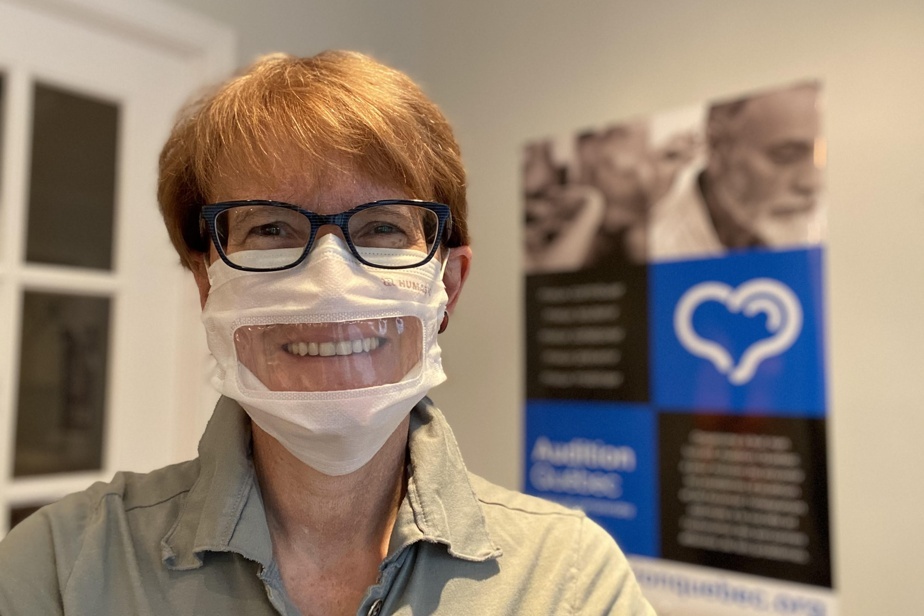(Montreal) Several organizations of the deaf and hard of hearing are calling on Quebec to provide networks of early childhood centers and health centers with appropriate masks with transparent windows.
In an open letter sent to the government, they deplored the cancellation of the last call for bids in order to provide “new window masks that are more effective and comfortable than those used previously.”
“This shift makes it difficult to hear for people in a difficult and frustrating situation,” writes Audition Quebec, Quebec’s Network for Social Inclusion for the Deaf and Hard of Hearing, and the Quebec Association of Children with Hearing Problems (AQEPA).
In recent months, childcare centers have been provided with transparent masks imported from abroad for teachers. However, they will remain unused because they turned out to be “inconvenient” and “uncomfortable”, according to comments collected by the signatory organizations, plus they mix easily, transfer poorly and cause allergic reactions.
However, there is a Quebec alternative. Entreprise Prémont in Louiseville, Mauricie, in collaboration with Audition Quebec, has designed a mask with transparent window that meets Health Canada’s requirements.
“It is very comfortable. No fog. It’s a little hard to breathe, but if it’s installed correctly, no problem. It’s also hypoallergenic,” Audition Quebec chairperson Jane Choquette explains to The Canadian Press.
Some consumer protection centers themselves have decided to purchase masks from Entreprise Prémont, she said.
The Directorate of Communications, with the ministries of family and education, said Quebec canceled the call for bids due to the amount of window masks sufficient to restock the entire network for about four months.
“For the proper management of public funds, the CAG [le centre d’acquisitions gouvernementales] This reserve must be disposed of before a new call for bids is launched. However, consideration is underway to launch a new public call for bids,” company spokeswoman Esther Chouinard explained in an email to The Canadian Press.
Organizations wonder how these stocks will be sold when masks with transparent windows are left aside in the net.
If she understands Quebec is first trying to sell its stock, Audition Quebec’s interim general manager, Julie Brousseau, calls on her to keep in mind that people are currently facing a “major communication breakdown.”
Children are deprived of lip reading and facial expressions “essential for their linguistic, social, and emotional development,” AQEPA supports.
“Lip reading of a person with a hearing loss can account for up to 40% of the additional information,” M explains.I Proso.
Although recommended by public health and early childhood experts, the use of window masks is “optional,” the Ministry of Family asserts.
“The choice of mask to be used should be done according to the type of activity with the consistent aim of ensuring the proper development of children. However, it does not need to be worn for a long time”, adds M.I Chouinard.
Equipping the entire health network
The signatories to the letter also want the Ministry of Health to launch a call for bids to supply its entire network of masks with transparent windows made in Quebec. Currently, the purchase decision will be up to each of the organizations.
We consider that this is not enough. I can tell you that going to see a doctor in the hospital and having a diagnosis that explains to you when you understand every fourth word because of his opaque mask, it’s not funny,” the master testifies.I Choquette, which provides its window masks to healthcare professionals during appointments.
Through the open letter, we also wish to make the whole population aware of the problems faced by people with hearing impairment since the beginning of the epidemic and the importance of masks with transparent windows, states the master.I Proso.
In addition to the controversy surrounding the quality of these masks, we must not forget that they are an “essential communication tool” for the deaf and hard of hearing, she says.
In Quebec, it is estimated that 1.6 million people have a hearing loss.

“Subtly charming problem solver. Extreme tv enthusiast. Web scholar. Evil beer expert. Music nerd. Food junkie.”



